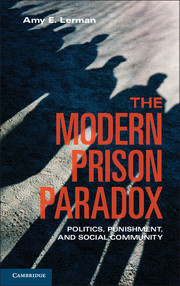Book contents
- Frontmatter
- Miscellaneous Frontmatter
- Contents
- Acknowledgments
- 1 The Modern Prison Paradox
- 2 Politics and the Punitive Turn
- 3 Public Policy and the Creation of Community
- 4 The Culture and Consequence of Prison
- 5 The Social Effects of Incarceration
- 6 The Social Effects of Prison Work
- 7 From Individuals to Communities
- 8 The Road to Reform
- 9 Epilogue (Or: How I Went to Berkeley and Wound Up in Prison)
- Appendixes
- Notes
- Index
5 - The Social Effects of Incarceration
Published online by Cambridge University Press: 05 June 2014
- Frontmatter
- Miscellaneous Frontmatter
- Contents
- Acknowledgments
- 1 The Modern Prison Paradox
- 2 Politics and the Punitive Turn
- 3 Public Policy and the Creation of Community
- 4 The Culture and Consequence of Prison
- 5 The Social Effects of Incarceration
- 6 The Social Effects of Prison Work
- 7 From Individuals to Communities
- 8 The Road to Reform
- 9 Epilogue (Or: How I Went to Berkeley and Wound Up in Prison)
- Appendixes
- Notes
- Index
Summary
Tell me thy company, and I’ll tell thee what thou art.
Miguel de Cervantes, Don Quixote (1605–1615)Existing scholarship presents competing theories of the effects harsher prison environments might have on inmates’ social attitudes and propensities for crime. By one reasoning, incarceration of any kind will have little effect. Indeed, underlying the modern concept of incapacitation is the implicit assumption that prison time is a holding pattern, during which individuals are removed from society and placed in institutions whose primary function is simply to contain them. Those who espouse this view of imprisonment argue that most inmates enter prison with an existing set of characteristics that have been shaped by formative experiences within families, school systems, and communities. The time that most inmates spend in prison is likely to be inconsequential relative to these other more salient sources of socialization, doing little to alter already deeply rooted predispositions. If this is the case, inmates exiting prison should be expected to be essentially no different than they were when they entered.
A rival school of thought argues that prisons can effectively discourage crime, changing attitudes in ways that decrease the likelihood of recidivism. Emerging from an economic theory of rationality, deterrence theory argues that when deciding whether or not to commit a crime, individuals will weigh the possibility of being caught and sentenced to a term of incarceration. The higher the “costs” associated with punishment and the greater the perceived probability of receiving it, the less motivated individuals will be to engage in criminal activity. T he specific deterrent effect might be particularly robust for first-time offenders, who learn the harsh realities of prison and update their perceived utility of re-offending accordingly.
- Type
- Chapter
- Information
- The Modern Prison ParadoxPolitics, Punishment, and Social Community, pp. 94 - 122Publisher: Cambridge University PressPrint publication year: 2013



